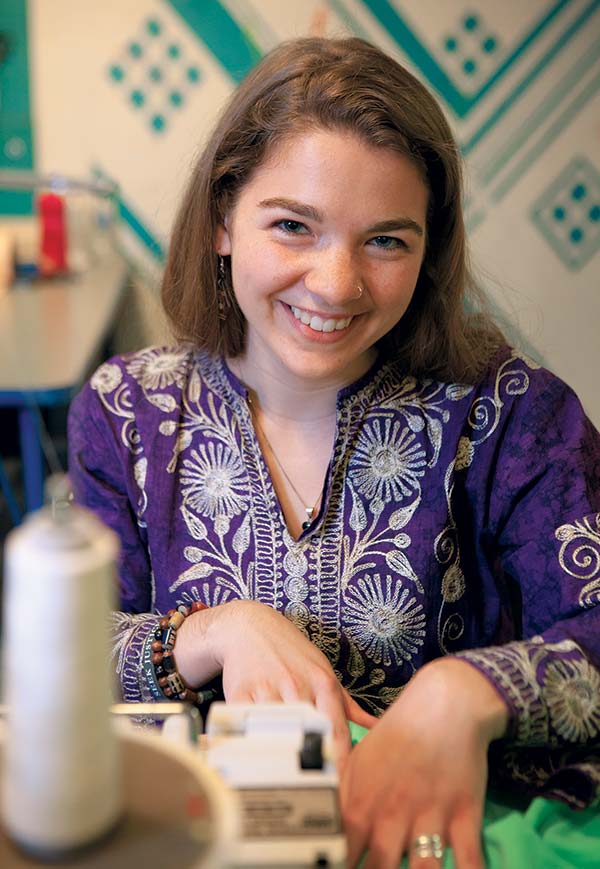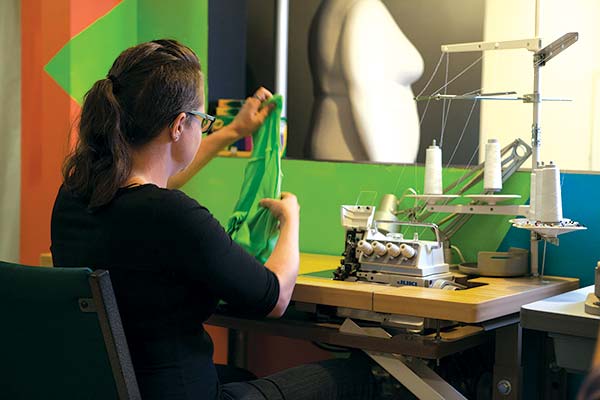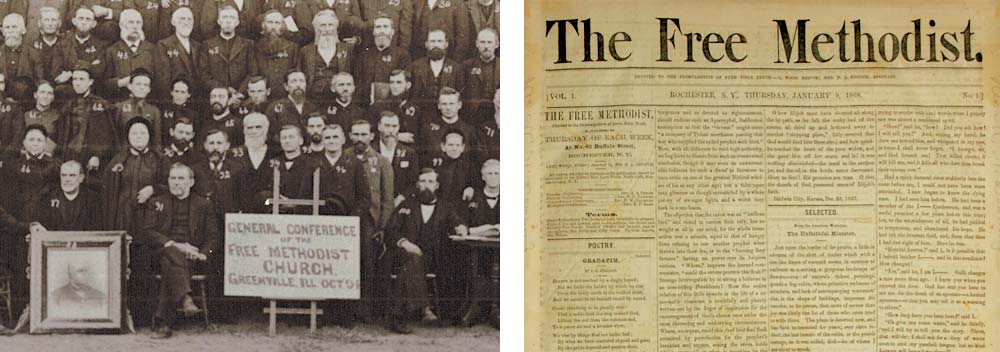 Reviving Our
Reviving OurFree Methodist Alumni and SPU Students Embrace the Cause
that Launched Our Founding Church
“Wherever we see inequities, we are required to be engaged in that struggle.”
“I’m a missionary to a problem, not a place … Slavery is everywhere.”

Kevin Austin ’84 with children in Manila, Philippines, where Set Free Movement and International Child Care Ministries support education and human trafficking prevention projects for children

SPU students ran in the Free Them 5K, to raise money for World Concern’s anti-trafficking programs, and race participants wrote messages of prayer and support for trafficking survivors (pictured).
“... the sentiment of our students responding is: ‘Enough is enough!’”

Entrepreneur Jessica Watson (below) and SPU senior Summer Downs are at work on the launch of TK Threads, an employment opportunity for survivors and those at risk of being trafficked.

They stood up and said “No more!” to inequality in the Methodist Episcopal church. They insisted that no one should have to pay to sit in a church pew. They opposed slavery. They sought to revive the Wesleyan convictions of the denomination’s 18th-century founders, especially care for the poor. They embraced the gospel’s message of equality.
And the Methodist Church of the mid-1800s kicked them out.
So, led by a pastor and visionary named B.T. Roberts, they went on to put the “Free” in Free Methodism, founding a new denomination. Doug Strong, dean of Seattle Pacific University’s School of Theology, sums up Roberts’ vision like this: “Wherever we see inequities, we are required to be engaged in that struggle.”
Roberts’ vision involved establishing educational institutions, including Seattle Seminary, which would become Seattle Pacific. “Roberts did not want only Bible-training schools,” Strong says. “He said specifically that he wanted Christian liberal arts colleges in order to produce the next generation of people able to speak into the needs of the culture from the perspective of the gospel.”

Above: Early Free Methodists pose with founder B.T. Roberts’
portrait at their general conference in 1893. Image: Marston Memorial Historical Center Right: The first
issue of The Free Methodist was published January 9, 1868.
(It became Light & Life Magazine in 1970 and is still published under that name.) Image: Light & Life Communications.
In Rediscovering an Evangelical Heritage (the new second edition), Strong writes that millennials, “like their antecedents in the 1840s and the 1970s” are “seeking an integration of their commitment to Christ with their social activism. ... Millennials are passionate regarding God and compassionate regarding the needs of the world. They demand a focus on Jesus and justice — a holistic biblical faith.”
It was that holistic vision that opened the eyes of Free Methodist missionary Kevin Austin ’84 to the reality of global human trafficking.
Serving in Thailand in 2001, Austin was distraught to learn that the city of Pattaya, “just down the road,” was a major global center of “sex tourism.” He investigated the scale of the exploitation and, in 2005, wrote to the superintendent for the Free Methodist Church’s Pacific Northwest Conference — Matt Whitehead ’79 — and other Free Methodist clergy. “Basically, I said, ‘We’re Free Methodists! What are we going to do about modern slavery?’”
Working with Whitehead, Austin drafted a resolution to bring before the 2007 Free Methodist General Conference. After committees and leaders collaborated on revisions, the resolution passed unanimously — 250 to zero. Thus it became the first modern church-denomination resolution against human trafficking and the foundation for the Free Methodist Church’s Set Free Movement.
Austin remains a full-time Free Methodist missionary, educating and equipping Free Methodist Church leaders and members to strive for slavery’s “re-abolition.” “I’m a missionary to a problem, not a place,” he says. “I just returned from Greece, Bulgaria, and Hungary. Before that I was in Michigan and 20 other states. Slavery is everywhere.”
Austin’s challenge to Free Methodists has inspired action from the Free Methodist church — and from Seattle Pacific.
As Lynnea Common, assistant director for the Office of Residence Life, browses her files full of details tracking campus events and student activist groups — an International Justice Mission club, The Abolition, UNITE, and now Set Free — she sees increasing zeal.
“I have witnessed a sense of students’ very real heartbreak over the realization that modern slavery exists,” she says. “While slavery may have taken different shapes and forms over the decades, the sentiment of our students responding is: ‘Enough is enough!’
“The next very real question has been: ‘What can I do?’ Whether it be a student engaging the topic of human trafficking in a research paper, or hosting an art display in Pioneer Square to donate the proceeds to the anti-trafficking movement, our students respond in genuinely meaningful ways.”
This year during Autumn Quarter, 20 freshmen attended USEM 1000, “Human Trafficking and the Modern Abolitionist Movement.” Taught by Margaret Diddams, professor of industrial/organizational psychology, they examined causes, consequences, and solutions.
“I believe the mission of the University attracts students who care about important topics,” says Common, “but it doesn’t stop there. Our students bring creative and engaging responses, and spur one another on to engage both personally and in their fields of study.”
As a freshman at SPU in 2013, Summer Downs sought opportunities to make a difference. Having worked in the Philippines with anti-trafficking organization International Justice Mission during her high school years, Downs was pleased to discover a club led by Chelsea Van Essen ’14. Van Essen helped establish a partnership between the club and Seattle’s First Free Methodist Church, working with Bonnie Burgoyne Brann ’72, who recently retired from her role as associate pastor. They renamed the club “Set Free” to reflect Free Methodism’s anti-slavery movement.
Mia Hays ’91, an administrative assistant for the Family and Consumer Sciences department, serves as advisor to Set Free. “We are trying to raise awareness, to be prayerful, to provide training, and to take action,” she says.
With an email list of about 400 students, Set Free holds weekly leadership meetings for planning and prayer, and monthly gatherings for club members. They host events with guest speakers (including state Senator Jeanne Kohl-Welles, a champion of anti-trafficking legislation) and screenings of informative documentaries; and provide support for local organizations, including Seattle Against Slavery and REST (Real Escape From the Sex Trade). They recently held a competition between SPU residence halls to raise funds for care packages given to trafficking survivors. Some members ran in a 5K to benefit World Concern’s trafficking prevention programs. And collaborating with Seattle Against Slavery and REST, they collected information from online classifieds in order to reach out to women in the sex trade, some of whom then set up appointments with social workers.
During March 2014, Downs joined Brann, Hays, SPU Nurse Practitioner Kristen Goetz Jones ’01 ’05, MSN ’09, and other SPU students on a trip to Athens, Greece, to work with Set Free Movement associate Kali Long and Christian organizations that support those seeking to escape sex slavery. They learned that women in a post-trafficking business program needed new ways to earn money. “We brought in people from SPU’s Family and Consumer Sciences’ fashion design [program],” Downs says. “The women had been making only purses and bags, and they wanted to step it up. These students put together new sewing patterns.”
The trip was a sobering experience for all of them. “We saw off-duty police going into the brothels,” she says. “That was hard to watch.” But it was also motivating. Downs, who is majoring in global development studies, succeeded Van Essen as Set Free president for the 2014–15 academic year, and she plans to continue in that role next year.
What’s more, Downs is working on a new front to serve those who are vulnerable to — and survivors of — trafficking.
“We’re starting a clothing brand,” says Downs. She and some classmates are launching the Seattle flagship location of TK Threads, a new brand for fashion company Tight Knit LLC. TK Threads will employ and provide a living wage for survivors of human trafficking and others at risk of exploitation. Workers will own their own sewing machines and work in their homes. Their products will compete with those produced by major global companies, but TK Threads has an advantage: local entrepreneur Jessica Watson, founder of Tight Knit LLC, is a world-renowned designer already popular with REI, Target, Roxy Quicksilver, and Zumiez. “She’s been to so many factories around the world,” says Downs, “and she knows what conditions are like there.”
Imagine this: You walk into a high-end department store. You see two red dresses side by side: One is a factory-made dress imported from a region known for human-rights violations, and the other was sewn by a free woman earning a living wage from TK Threads. “You’ll read her story and see her picture,” says Watson. “The dresses will be the same quality, both with great designs. We believe people will choose to support these women.”
They have good reason for confidence. TK Threads won SPU’s Social Venture Competition’s $2,000 runner-up award and the $1,000 Don Summers People’s Choice award.
And if consumers buy TK Threads clothing, they’ll play a small but crucial role in advancing the Set Free movement. While the Free Methodist founders would surely be dismayed to learn about the prevalence of slavery today, no doubt they’d find these students and their passion for freedom inspiring.